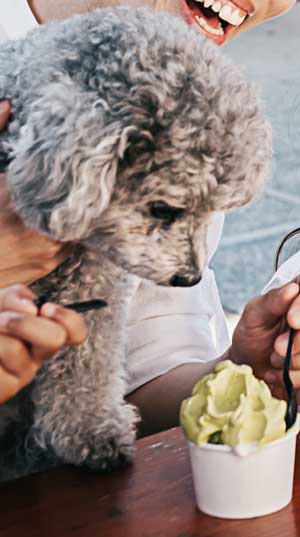Brain freeze is a common experience for many people, but can dogs get brain freeze as well?
While dogs cannot experience this cold-induced sensation in the exact same way that humans do, they can still experience similar symptoms due to their anatomy and habits. In this article, we’ll explore the topic of brain freeze in dogs, including whether they can eat ice, ice cream, and if they can get headaches.
What is Brain Freeze and How Does it Happen?
Brain freeze is a type of headache that occurs when something cold, such as ice cream or a cold drink, touches the roof of the mouth. This rapid change in temperature causes the blood vessels in the head to constrict and then dilate, leading to a headache. Brain freeze is not harmful and typically goes away on its own within a few minutes.
Brain freeze is a type of headache that occurs when something cold, such as ice cream or a cold drink, touches the roof of the mouth. This rapid change in temperature causes the blood vessels in the head to constrict and then dilate, leading to a headache. Brain freeze is not harmful and typically goes away on its own within a few minutes.
Can dogs get brain freeze?
Yes, dogs can suffer from brain freeze. Since they have the same anatomy type as humans, they are susceptible to the same rapid changes in temperature that cause this type of headache. However, it is unlikely that a dog will seek out cold foods or drinks on its own, so it’s less common for them to experience dog brain freeze. If your dog does eat something cold and appears uncomfortable afterwards, you may want to consult a veterinarian just to make sure there isn’t an underlying health issue causing their discomfort.
How can I prevent brain freeze in my pet dog?
The best way to prevent brain freeze is to avoid eating or drinking things that are extremely cold. Eating ice cream slowly and taking breaks between bites can help reduce the risk of brain freeze. You should also keep an eye on your dog when they are eating or drinking something cold, as they cannot always tell you if their head is starting to hurt. If you notice any signs of discomfort, remove the cold food or drink from them immediately and offer them something at room temperature instead. This will help reduce the potential for brain freeze in your pet pooch.
Some frozen treats your dog can enjoy are:
- Frozen bananas
- Unsweetened applesauce cubes
- Yogurt popsicles
- Peanut butter frozen treats
- Vegetable broth ice cubes
- Pureed pumpkin frozen treat
By offering your dog these types of treats, you can provide them with a cool snack in the summertime and reduce the risk of brain freeze. Additionally, always make sure that whatever treats you offer are safe for dogs to consume and don’t contain any ingredients that could be harmful to their health.
Can Dogs Eat Ice and Ice Cream?
Dogs can eat ice, but it is not recommended as it can be a choking hazard. Additionally, some dogs may find it uncomfortable or even painful to eat ice due to sensitive teeth.
Ice cream is also not recommended for dogs as it contains ingredients that can be harmful to them, such as sugar and caffeine. If you want to treat your dog to a special treat, there are many dog-friendly options available, such as frozen peanut butter or plain, unsweetened yogurt.
If you choose to give your dog ice cream, make sure it is sugar-free and does not contain any artificial sweeteners or other potentially toxic ingredients. It’s also important to remember that dogs should never be given large quantities of dairy products as they cannot digest them properly. Lastly, be mindful of your pet’s individual needs and consult with a veterinarian before introducing new foods into their diet.
Although it is generally safe for dogs to eat ice or enjoy the occasional treat of ice cream in moderation, it can still be unsafe if consumed in excess or by certain breeds who are more sensitive than others. Always follow the advice of a professional vet when determining what is best for your pup!
Which ice cream brands can dogs eat?
There are some ice cream brands that make special products just for dogs. These include Canine Confections, Frosty Paws, DogIce Cream, and Poochsicles.
It is important to read the label carefully before feeding your dog any of these treats as they may contain ingredients that can be harmful to your pup.
Additionally, it’s best to consult with a veterinarian before introducing any new foods into their diet. Be sure to always provide your pet with plenty of fresh water after consuming any type of treat or human food in general. This helps them stay hydrated and prevents dehydration.

Can Dogs Get Headaches?
Dogs can experience headaches. Headaches in dogs can be caused by a variety of factors, including underlying medical conditions, dental problems, or even eye strain. If you suspect your dog is experiencing a headache, it is best to consult with your veterinarian for a proper diagnosis and treatment plan.
Other Conditions That Can Affect a Dog’s Brain
While dogs cannot experience brain freeze in the same way that humans do, there are other conditions that can affect their brain and cause similar symptoms. These include:
Hypoglycemia
Hypoglycemia, or low blood sugar, can cause a dog to feel disoriented, confused, and even have seizures. This is more common in small dogs and can be caused by not eating enough food or by a medical condition such as diabetes.
Meningitis
Meningitis is an inflammation of the protective membranes surrounding the brain and spinal cord. Symptoms of meningitis in dogs include fever, neck pain, and sensitivity to light and touch. Meningitis can be caused by a bacterial or viral infection and requires prompt veterinary treatment.

Conclusion
While dogs exactly get the same type of cold sensation as we do, they can still experience similar symptoms due to their anatomy and habits.
If you suspect your dog is experiencing a headache or any other brain-related symptoms, it is important to consult with your veterinarian for a proper diagnosis and treatment plan.
Remember, it’s always better to err on the side of caution when it comes to our furry friends!
